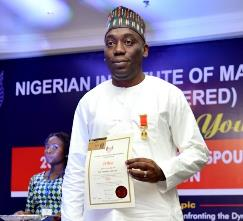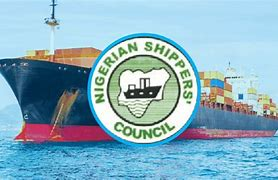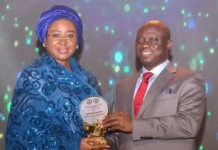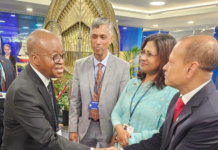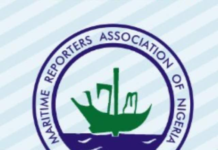The management of Nigerian Shippers Council (NSC) has revealed how it waded into the issue of damaged exports in one of the nation’s seaports situated in Nigeria’s commercial nerve centre, Lagos.
To this end, it has resolved a complaint of two damaged export containers of black eye beans to Jebel Ali Port, Dubai, United Arab Emirate (UAE) shipped from Kaduna Inland Dry Port (KIDP) by USBAB Multi Choice Limited (exporter) who attributed the damage to the delay allegedly caused by Inland Container Nigeria Limited (ICNL), the forwarding agent and MAERSK Nigeria Limited, the carrier.
This was contained in a letter of complaint received via NSC Office, Kaduna. In the letter, the Managing Director of USBAB Multi Choice Limited, Mr. Usman Baba Ahmad stated that two export containers of cowpea black eye beans were damaged.
He put the value of the beans at $104,111.75 while the total terminal and documentation cost was N1, 653, 205.88.
He identified delay by ICNL and MAERSK Nigeria Limited as being responsible for the damage and requested NSC intervention for the refund of the money.
According to him, if the cargo was shipped on schedule, having paid all necessary charges to ICNL from the beginning of the transaction, the damage would have been averted.
Giving an insight into what transpired from when the cargo was forwarded to ICNL to when it was eventually shipped out of Nigeria, he denied receiving any notification from either FPIS or ICNL on recommendation that fumigation should be repeated after expiration of 21 days as contained on the certificate of quality, fumigation, good packaging materials and weight.
To buttress his assertions, the complainant presented additional claims received from the importer in UAE and other documents just as he called for the intervention of NSC in recovering all funds spent on the beans and the export processes.
Sequel to the complaint, the NSC held tripartite meetings at its Kaduna office where all relevant parties were present.
These include USBAB Multi Choice Limited, KIDP, ICNL, Federal Produce Inspection Service (FPIS), Anglia International Services Limited (pre-shipment agent) and NSC Complaints Team from its head office in Lagos. The main agenda of the meeting was to amicably resolve the lingering complaint.
While welcoming attendees, NSC Deputy Director, Kaduna Port Office, Mr. Paul Garnva who acted as the Chairman at the meeting venue, stated that his office regulates the dry ports and protects shippers in terms of cost, effective and efficient service delivery.
He noted that since the commencement of operations, over 16 TEUs import containers have been cleared while over 50 TEUs export containers were handled. He added that the essence of the meeting was to dialogue with a view to arriving at fair and amicable resolution.
NSC Head, Complaints Unit, Mr. Daniel Orume, accompanied by an Assistant Director (Complaints) Mr. Danjuma Buba and Mr. Hassan Aminu, a Principal Operations Officer in his remarks stated that this intervention is crucial, being the first to be held at Kaduna Port Office. He said in line with NSC Port Economic Regulation Order 2015, the NSC Complaints Unit is saddled with the responsibility to find solutions to issues relating to disputes between providers and consumers of shipping services in the industry.
Continuing, Orume who is a Deputy Director and former Personal Assistant to erstwhile Executive Secretary and Chief Executive Officer (CEO), NSC, Barrister Hassan Bello said: “There is need for the council to carry our investigation and reach necessary resolutions. It relies on documents presented by all parties involved in disputes”.
According to him, from the Nigeria Drugs Law Enforcement Agency (NDLEA), the containers were put on hold for almost one month.
On ICNL counter submission that it was informed late by MAERSK Nigeria Limited, NSC sought empirical evidence to authenticate when both MAERSK and NDLEA informed the terminal as well as when they engaged NDLEA for the release of the containers.
In a bid to get to the root of the matter, Orume sought clarifications from FPIS, statutorily responsible for issuance of certificate of quality, fumigation, good packaging materials and weight on explanation on which of the agencies in the export clearance chain is in charge of moisture owing to the fact that the space for moisture content of commodity on the certificate was blank.
He also raised issues on the delay in trying to correct the Bill of Lading of the damaged cargo; sought to know from the pre-shipment agent, the type of container most suitable for export of agricultural produce; and who is to advise on packaging of all export cargoes.
Representatives of Anglia International Services Limited, the pre-shipment agent, Messrs. Bodam Sammy and Hyacinth Louis informed the meeting that they received the beans and inspected it in line with their mandate.
According to them, some of their responsibilities include ensuring that documentation and goods declared by the exporter has no disparity, ensure that Nigeria Export Supervision Scheme (NESS) fee is in conformity with the goods declared, proper documentation and submission of report of inspection to their head office for issuance of Clean Certificate of Inspection (CCI). Packaging or the choice of the type of bag is based on the specification of the buyer, the exporter must ensure strict adherence to that. Where there is discrepancy, CCI would not be issued and where there is observation by any of the agencies in the export clearance chain, we are supposed to be informed. In this case, no agency informed us of any observation.
The pre-shipment agent noted that in this instance, everything was properly done as thorough check was carried out on the bags and the type of beans.
“In line with the physical examination, there was nothing wrong with the beans as at the time of inspection. We carried out their inspection and issued CCI when all the agencies have completed their processes and our role terminates at that point”, it added.
On its part, a representative of FPIS at the meeting, Mr. Usman Suleiman, stated that it inspected the beans and found it to be well dried without stone and certified it to be of exportable quality.
According to Suleiman, FPIS fumigated the two containers. The only thing we observed was that during stuffing, the containers were not properly dressed. We pointed this out but the response of ICNL was that the containers would not stay long. If the dressing was to be done, it would not have been possible to move the containers that day to Lagos as desired by the exporters.
On the type of container most suitable for export of agricultural produce, the representative said any type of container could be used provided it is “clean and free of insects.”
Representatives of ICNL, Messrs. Rotimi O. and Salami O. Rasaq informed the meeting that the damage to the beans was “unfortunate”. They added that they received the cargo at Kaduna Inland Dry Port and transported it to Apapa Port, Lagos within 15 days.
They also stated that the exporter commended processing of documents such as form NXP, NESS, and others after the beans had arrived at KIDP
They explained that during stuffing, the FPIS officials drew their attention to the “need to dress the containers with dry papers and bags, but the representative of the exporter (Mr. Ahmed) insisted the stuffing should continue.” They added that the trucks conveying the goods left Kaduna for Lagos but on arrival, it could not access the port immediately due to MAERSK policy which only allows truck access in to the port on Mondays, Wednesdays and Fridays, which hindered timely gate-in to the terminal “.
They noted the fact that NDLEA “put on hold” the cargo to a great extent, contributed to the delay because neither MAERSK nor NDLEA informed them on time. This according to them accounts for the reason why they missed two vessels that the cargo previously scheduled.
Following a careful assessment of all the documents submitted during the previous tripartite meetings, the legal advice received from NSC Directorate of Legal Services as well as review of the roles both parties played in the transaction, NSC resolved that liability sharing formula should be 70 percent for ICNL being the appointed terminal operator and forwarder with the responsibility to ensure that the cargo is transported and delivered in safe and good condition, while 30 percent is for USBAB Multi Choice Limited for failure to heed experts’ advice on how to properly preserve the beans and prevent it from damage.
While expressing appreciation to NSC for its intervention, one of the parties involved in the dispute, ICNL asked the management of the council for a further review of the liability sharing formula.
Maritime Bits had reported that NSC as the port economic regulator in the marine and blue economy sector has a primary responsibility to facilitate trade and to protect the interest of shippers by promoting fair trade practices and ensuring shipping companies comply with approved standard operating procedures (SOP).

